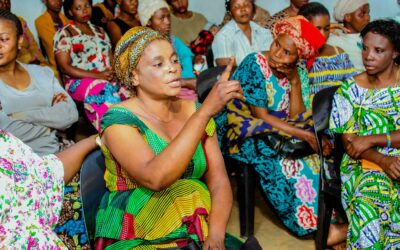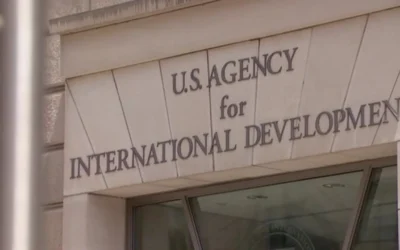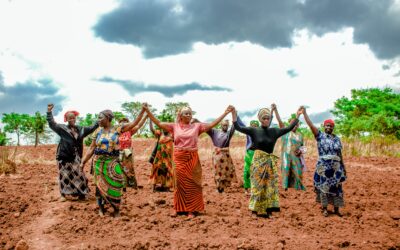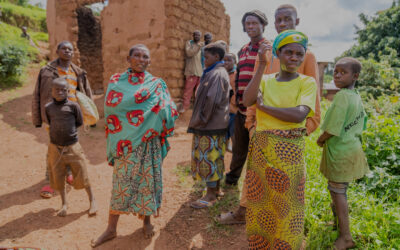Best Practices for Preventing Human Trafficking
Human trafficking is defined as the recruitment, transport, transfer, harboring, and receiving of people, typically by force or coercion, for the purpose of exploitation. Trafficking can take many forms. One of ODW’s partners, Next Generation Nepal (NGN), stops trafficking before it starts by raising awareness about the manipulative tactics used by traffickers. Today, we’re learning from NGN Program Director, Rupa Sitaula, about recommended practices for educating rural communities about trafficking:
***
Despite the efforts of the Nepal government and non-governmental organizations to combat trafficking within the country, various forms of human trafficking still exist. Orphanage trafficking, being one, is a form of trafficking in which children are removed from their families, often under false promises, and transferred or recruited into orphanage care where they often face various forms of exploitation for profit. Therefore, educating communities about human trafficking is essential.
Proven methods used by Next Generation Nepal to educate communities on trafficking:
Community Awareness through Street Dramas:
Street drama performances, one of the most effective methods, paint a visual story for people, and create a lasting impact on communities. Our team of skilled actors, led by the field officer, travel to remote villages to educate vulnerable communities on trafficking dangers. Street drama scripts are designed to engage and entertain audiences while highlighting the dangers of trafficking and emphasizing the importance of family-based care. Street dramas also give them an opportunity to share their opinions about trafficking within their community.
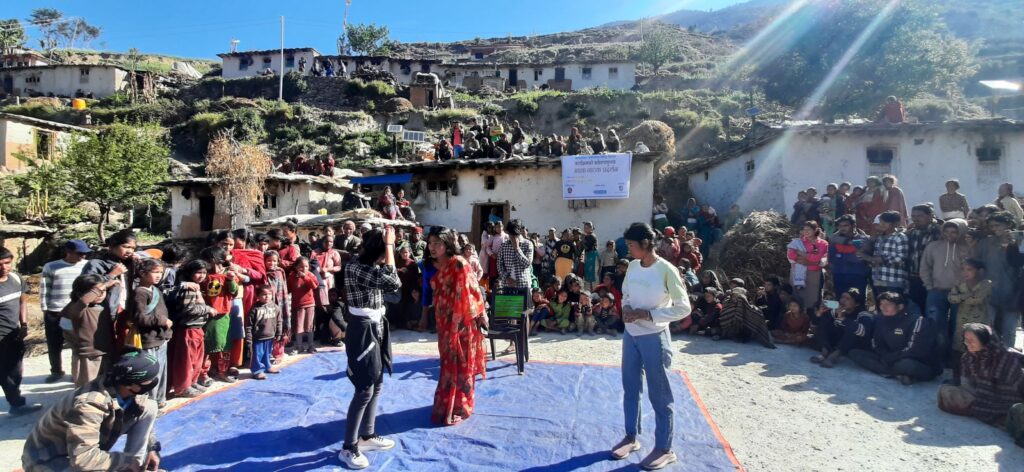
Next Generation Nepal hosts a drama about the dangers of trafficking in a rural part of Kalikot District (2023).
Radio Jingles for Mass Outreach:
To reach remote areas where access to other forms of media is limited, NGN collaborates with local radio stations to create jingles that convey messages on raising awareness, preventing child trafficking, and promoting family-based care.
Sensitization Meetings with Child Clubs and Women Groups:
NGN acknowledges that empowering children is vital to preventing trafficking. In addition, NGN believes that women play a major role in safeguarding their families and communities from trafficking. Therefore, through these meetings, NGN encourages children to report suspicious cases to the police and local child helplines, educates them on trafficking dangers, and helps them understand their rights. Also, they educate women about the warning signs of trafficking, current legal provisions, and the importance of reporting suspicious activities.
Sensitization Meetings with School Management committee and teachers:
School management committees and teachers can prevent and stop trafficking cases in various ways, including monitoring absenteeism. NGN works closely with teachers and school management to identify children at risk and address potential trafficking situations. Also, NGN works to integrate anti-trafficking messages into curriculum and activities.
Interaction Meetings with Local Government Representatives:
NGN conducts meetings with local governments, leaders, and activists to address issues of trafficking and encourage active participation as they have vital roles in their respective communities. NGN also collaborates with local government representatives to advocate for policy reforms and resource allocation towards anti-trafficking efforts.
Sensitization Meetings with Transportation Management Committees:
Transportation systems often unknowingly support trafficking because children are trafficked from one place to another using various forms of public transportation. NGN collaborates with transportation management committees, drivers, and conductors on trafficking indicators and prevention strategies. Through these meetings and training sessions, transportation personnel are trained in identifying and reporting cases of human trafficking.
***
Want to learn about how One Day’s Wages supports global efforts to prevent trafficker and support survivors? Read more and join us in the fight against human trafficking!
More stories of impact
Turning Challenges into Opportunities: Masoka’s Journey of Empowerment
Masoka’s hands are stained with the rich soil of the land she now calls home. A 37-year-old mother of four, she arrived at Dzaleka Refugee Camp in Malawi after fleeing the conflict in her home country, the Democratic Republic of the Congo. The future felt uncertain,...
What Was USAID, and What Now?
USAID has made news headlines constantly over the last few months. You may find yourself wondering: what is USAID, and is One Day’s Wages affected by its dismantling? As a global development organization, we at ODW care deeply about the people who depend on foreign...
Growing Love, One Drop at a Time: How One Woman Turned Her Birthday into a Gift of Clean Water
When Sara, a graphic designer and mother from Oregon, started thinking about how to celebrate her birthday, she decided to do something different—something meaningful. With a belief that “we are all connected… with the power to affect change by how we live our own...
Bridging the Gap: An Update on Our Response to the Funding Freeze
In Matoh, Cameroon, a mother prepares to give birth. Life in a conflict zone means getting to a safe facility with trained health workers is nearly impossible. Fortunately, a new mobile clinic begins offering prenatal care and transportation to a birthing clinic,...
Why We Invest in Women
There’s an old Ghanaian proverb: “If you educate a man, you educate an individual. But if you educate a woman, you educate a family.” On this International Women’s Day, we celebrate the power of women—how their resilience, leadership, and determination transform not...
The Case for Social Inclusion
Today is the World Day of Social Justice! Never heard of it? Never fear, we’re here to fill you in. In 2009, the United Nations General Assembly launched the World Day of Social Justice to recognize our on-going need for inclusive economic development and decent work...
LEARN
Leadership
Transparency
Read the Latest
Contact Us
COLLABORATE
Faith Groups
Schools
Businesses
Get Involved
One Day’s Wages exists to alleviate extreme poverty by investing in, amplifying, and coming alongside locally led organizations in underserved communities.
©2025 One Day's Wages is a registered 501(c)(3) organization | Tax ID #26-2566653 | Privacy policy | Terms of use
P.O. BOX 17575 Seattle, WA 98127 | Contact us

